|
'Pilgrim' stems from the Latin peregrinus, which originally meant foreigner, wanderer, exile, and traveller, as well as newcomer and stranger. The participants of Apostlahästar på Gotland discovered the island beyond the conventional tourist perspective through the temporary role of the pilgrim. By wandering through the cultural heritage and natural environment of Gotland they explored the past of the island to understand our present and visualize our future.
The pilgrim group was made up of people from different countries: Sweden, Belgium, Denmark, Germany, Finland, Russia, Dominican Republic, Vasque Country and Spain. Pilgrims were joined the walk at different times and places. Some of them all the way, although most of the pilgrims participed from 3 days to 3 weeks.
For this project, a set of rules were written dow for fostering a specific attitude among the participants: The commitment of Pilgrim.

|
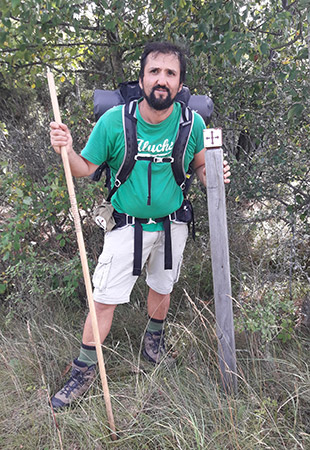 |
Juanma González |
| Spanish |
| Artist and pilgrim |
"I walk as both pilgrim and artist. I walk for creating a social exchange. I walk for understanding myself in a stranger environment. I walk for exploring. I walk on a route made by stories that people tell me. Now, when walls are built to separate people, I propose to go through a route to join people."
Walked all the way. From July 18th to August 8th |
|
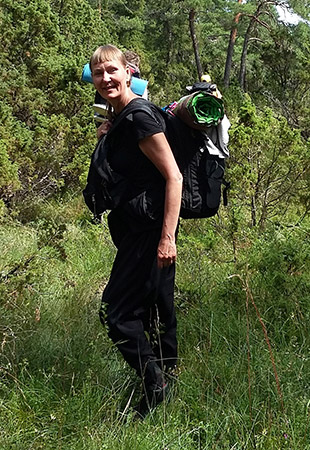 |
Åsa Hjortzberg Lie |
| Norgewian/Swedish/Belgian |
| Visual artist |
"I felt like a walking traveller exploring unknown mental and physical
landscapes. About the relationship with locals, all meetings were brief and fruitful. Too brief for a relationship, but with a two-way curiosity and much generosity. "
Walked all the way. From July 17th to August 8th |
|
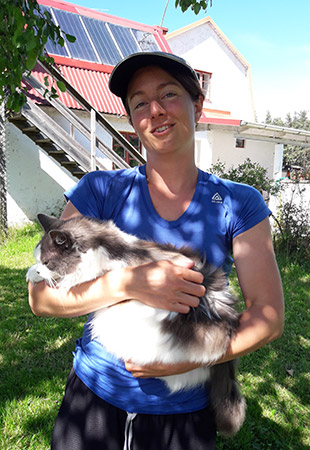 |
Anne Sofie Scherrerrebeck |
| DANISH |
| Social worker |
"we were creating a new discourse about our own lives: A discourse where
you do not decide everything on your own, but in a group; where you do not
only depend on yourself but more on the group; where you are nok free to
think only about yourself, but need to listen to (or just feel) what the
group needs. And where you cannot get everything you want in the moment
you want it, because you chose a more simple life."
Walked from July 17th to 24th |
|
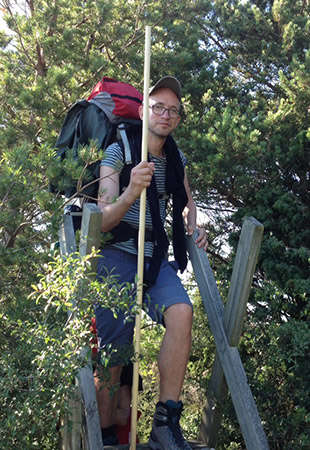 |
Simon Gorm Andersen |
| DANISH |
| Artist |
"The spirituality I reached on the way was a kind of slowness zen, slowly
walking through the country both physically and mentally feeling country
(and people). A kind of being one with the world or in the wold. (That's
probably the closest I can come)."
Walked from July 17th to 24th |
|
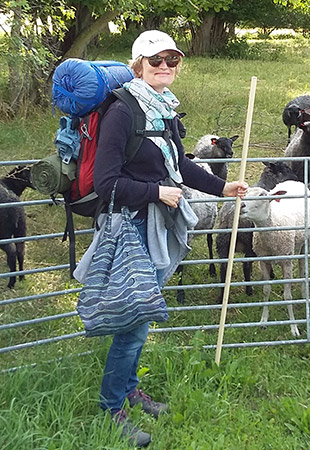 |
Gesa Schoop |
| GERMAN |
| teacher |
"The pilgrimage made me rethink spirituality and think about the question
what you really need in life to be happy."
I learnt about Swedish hospitality and friendliness. I got an insight into
Swedish history and how the locals are connected to it. We gave the locals
the opportunity to help us and to connect with us. We also worked for them
in the Viking Village. Being an international group they learnt about
different nationalities."
Walked from July 19th to 27th |
|
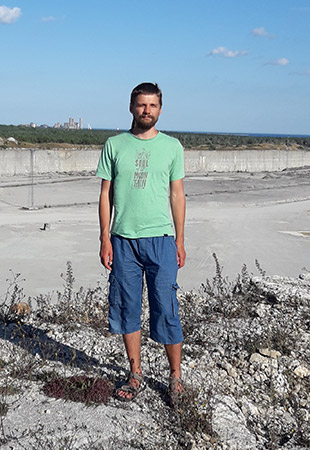 |
Igor Polskiy |
| RUSSIAN |
| Teacher, writer, musician and environmentalist. |
"I had a feeling of being pilgrim, not a tourist. We slept in really
special places, we were pilgrims for people, not tourists. People didn't
want us for money, it was about communication and sharing. We didn't
choose touristic paths and we had nice goal - to spread a word about this
type of travelling. So we were pilgrims."
Walked from July 21st to August 8th |
|
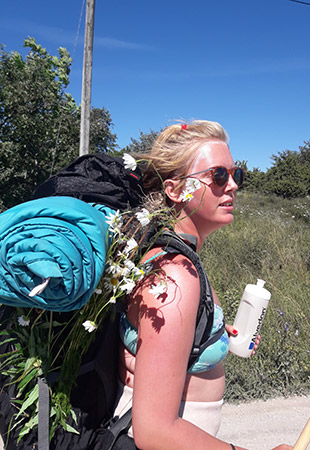 |
Isabelle Sirelius |
| Sweden |
| artist |
"It was very hot and i was struggling with the weight of the bag. I got a
walking stick that helped me carry the bag and keep a stable rytmh. We
walked for about Three hours and then we came to a beach where we swam and
ate lunch. The water was cold but refreshing."
Walked from July 21st to 23rd |
|
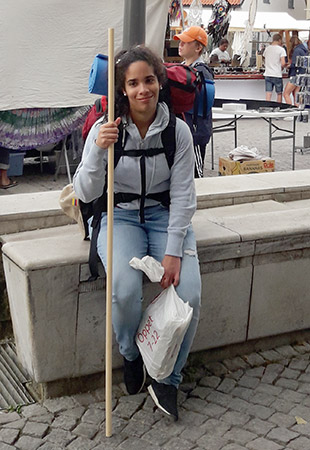 |
Ivannia Melissa Santana Miranda |
| Dominican Republic |
| Architect |
"It was indeed short, it was my first experience as pilgrimage, but the
things is that work does not allow me much more with my deadlines. I felt
I needed to do it. Thank you all for all the harmony, caring and memories
for life. Step by step in the healing process."
Walked from July 28th to August 30th |
|
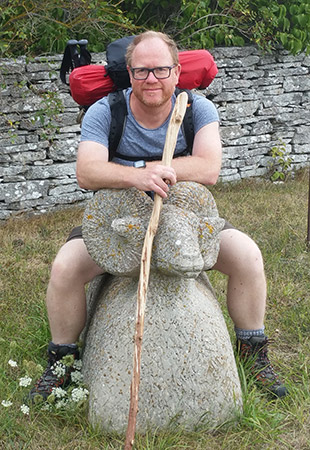 |
Peter Lüttge |
| German/Finnish |
| Journalist at Yleisradio |
"Tt was so great to be a part of Juanma's living sculpture. The Pilgrimage
was exiting. I now know the island of Gotland and the people living there.
We really became friends with a lot of people, both pellegrinos and
locals. Not so bad result for 10 days walking."
Walked from July 28th to August 8th |
|
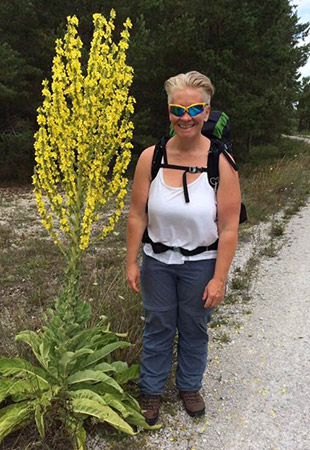 |
Dorothee Schulte-Basta |
| GERMAN |
| social politics speaker |
"All the people we met were amazing. Nevertheless there was a difference.
The difference is: some people opened their homes, and some, on top of
that, opened their hearts. Both are great and can not be taken for
granted: both are gifts. I really got a new feeling for the importance of
hospitality."
Walked from July 28th to August 8th |
|
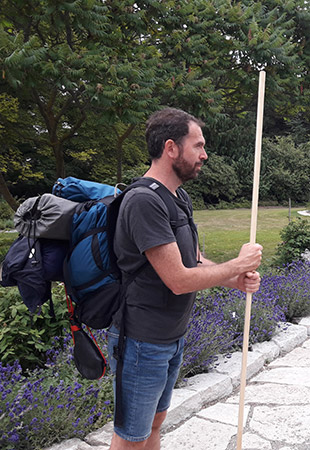 |
Aritz Solaeta |
| EUSKADI |
| Archeologist |
Walked from July 30th to August 1st |
|
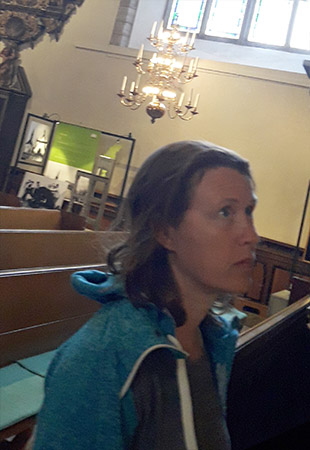 |
Saga Blomberg |
| SWEDEN |
| Music teacher |
Walked from July 30th |
|
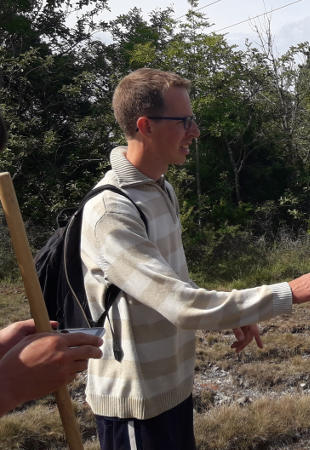 |
Nils-Erik Norrby |
| SWEDEN |
| Journalist |
Walked from July 30th, August 6th and 7th/8th |
|
 |
Annki Hedström Karlsson |
| SWEDISH |
| Artist |
Walked from July 30th, August 6th and 7th/8th |
|
 |
Klara Michold |
| SWEDEN |
| Violinist |
Walked from July 30th, August 6th |
|
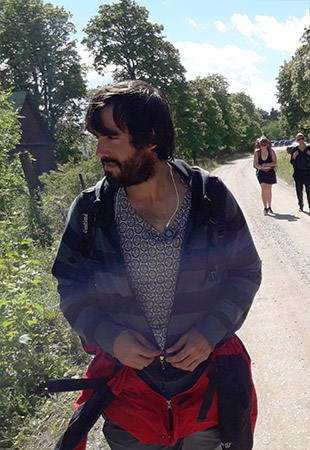 |
Alex G.Aretxabaleta |
| EUSKADI |
| Cook |
Walked from 2nd to 5th |
|
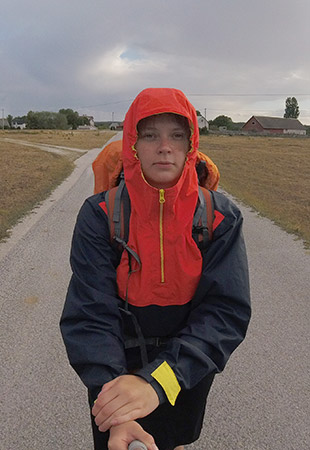 |
Katerina Podovinnikova |
| RUSSIAN |
| Economist |
" Each one that we've met on the way just wanted to help us in all innocence. It looks like locals and pilgrims were on one wave, everyone just were interested in each other like an in a new book with some special story."
Walked from 4td to 8th |
|
The commitment of the pilgrim

-
1. Become a Pilgrim
Participant is not a tourist. Participant is a Pilgrim.
Tourist and Pilgrim have the same behaviour: to escape the environment the everyday life. But Pilgrim's approach is beyond the hedonistic attitude of the tourist. This one only seeks a punctuation mark in his/her biography, while PIlgrim makes a ritual by her/his journey.
And the other hand, Pilgrim comes from the Latin Peregrinus that means stranger, foreigner, wanderer. traveller and newcomer. As a person from abroad, participant will explore Gotland along the traces left by the past, to understand our present and visualize the future.
-
2. Reach a purpose.
APOSTLAHäSTAR På GOTLAND was born from an individual experience to become collective project by conceiving a multi-identity group of people walking on a specific island.
In this community, there will not be an authoritarian entity. Rules will be negotiated by pragmatic agreements. We will formulate a harmonized structure in order to overcoming contingencies will happen along the way.
There is just one purpose: to reach together every step on the way.
-
3. Create a room for understanding.
This commun agreement will realize the possibility of peaceful and harmonious coexistence. Diverse group of people can live together, without distinction of any kind of race, colour, sex, belief or nationality.
Pilgrim will use the path as a room for respecting the difference between people. A room for accepting the diversity with enriches us. A room for placing discussions about the current political and environmental concerns. A room where peace becomes militant.
Now, when walls are built to separate people, APOSTLAHäSTAR På GOTLAND goes through a route to join people.
-
4. Produce positive energy.
The Pilgrim attitude involves self-discipline from everyone. Participants could be required to walk an average of 20 km per day Also, there will be days that they sleep on beds and another ones on the floor of churches.
It is necessary to reach a positive and constructive attitude among Pilgrims to implement the project.
Smiling, humour and positive energy are tools for cohesion and going-on.
With physical exertion and daily contact, the social masks fall down for showing us as we are. In this stage, Pilgrim has to respect others, letting individual spaces and understanding diversity of personalities.
-
5. Explore the social capital.
In order to break the alienation between visitors and locals made by the tourist industry, APOSTLAHäSTAR På GOTLAND will produce relational situations where sustainable is created, shared and maintained collectively.
The method will be twofold. One is concerning to pilgrims who will live off the social capital that Gotland is offering to them. Pilgrims will be fostered to buy all the food to local producers as farmers or fishermen. This means that Pilgrim's menu will be similar many days and they might carry food in the backpacks.
Second, Pilgrims will take an active part in events to promote the engagement of local communities on the route: cooking dinners, participatory performances and sharing encounters.
-
6. Walk as a poetic gesture.
APOSTLAHäSTAR På GOTLAND starts and ends on foot. The most slowly way for traveling becomes a reaction against the speed of everyday life and an aesthetic practice for exploring the surrounding world. Moving by food is a way of tributing the land that Pilgrim passes through: natural environment, rural communities, sustainable agriculture, ancestral traces and relational encounters. To show respect for the territory of others by being awareness of the current environmental concerns. In case of Gotland, the most disturbing problem faced by the inhabitants is the lack of freshwater.
-
7. Fight against fear.
Nowadays, society is based on a climate of permanent insecurity and inconsistent surrounding. Media promotes the fear rather than understanding among countries. Through an intercultural approach, APOSTLAHäSTAR På GOTLAND encourages Pilgrims from different backgrounds to show that there is not fear when people work together for building a community. Marching together will write a statement as a peaceful action at turbulent times in which we live.
-
8. Register the journey.
As 21st century pilgrim, the journey will be documented on the media. APOSTLAHäSTAR På GOTLAND encourages to the Pilgrims to write about their experience, to draw about their insights, to capture the experiences with their cameras, to register the activities, to record sounds, to perform in the happenings. Collecting all this walking-production for publishing a book as a memory of an unique event.
-
9. Accept the deal
The decision to become a Pilgrim for APOSTLAHäSTAR På GOTLAND implies unconditional acceptance and support of the above points: to participate actively in group activities. To show respect for the arrangements, specialty regarding accommodation and food concerns. To accept individual differences to demonstrate that there is not fear to the OTHER. To move together in the same direction as a demonstration that we are not alone. To explore a specific island as a reflection of human behaviour in the shifting world in which we live. Walking so that steps leave a footprint that shall resonate for long time
|

















